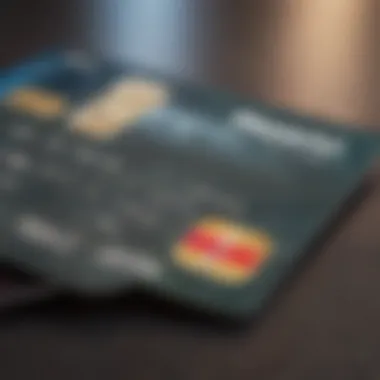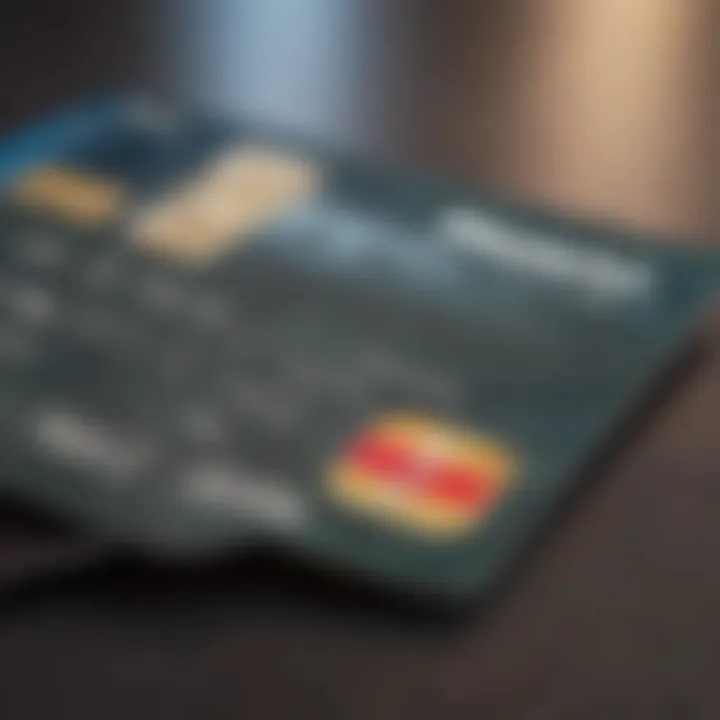Exploring Mortgage Payments with Credit Cards


Intro
The notion of managing mortgage payments through credit cards raises significant questions in personal finance. Many individuals may find themselves struggling with cash flow, especially when it comes to meeting monthly mortgage demands. This leads to exploring alternative methods, such as credit card payments. The potential for earning rewards, as well as convenience, makes this option appealing, yet it is equally fraught with risks and drawbacks.
In this article, we will analyze the feasibility of using credit cards for mortgage payments while highlighting the various factors involved. We will explore credit management, the implications of this practice on credit scores, and the various payment strategies that can mitigate risks. With this information, readers can navigate the intricacies of their own financial decisions more effectively, ensuring a balanced approach to home ownership and credit utilization.
Credit Management
Importance of Credit Scores
Understanding credit scores is crucial in today's financial landscape. A credit score reflects an individual’s creditworthiness and influences interest rates on loans, credit availability, and overall financial health. Mortgage lenders typically assess credit scores to determine the likelihood of timely payments. A low score can lead to higher interest rates or loan rejections. Conversely, a good score can facilitate more favorable lending terms.
Ways to Improve Credit Score
Improving a credit score involves several strategies:
- Timely Payments: Ensuring bills are paid on time is fundamental to maintaining a positive score.
- Reducing Debt: Lowering credit card balances can improve credit utilization ratios.
- Credit Mix: A varied credit mix, including installment loans and revolving credit, can have positive effects.
- Regular Monitoring: Keeping track of your credit report can help identify any errors or fraudulent activities.
How to Monitor Credit Report
Monitoring your credit report is an important aspect of credit management. Consumers can obtain reports from agencies like Experian, TransUnion, and Equifax. Regular checks will ensure accuracy and provide insights into factors affecting your score. Additionally, services like Credit Karma can offer free updates and tips to improve your score.
Potential Consequences of Paying Mortgages with Credit Cards
Using credit cards to pay a mortgage comes with specific considerations. While it may provide short-term relief, there are several consequences to factor in:
- High Interest Rates: Credit cards often carry higher rates compared to traditional mortgage rates, leading to more interest paid over time.
- Potential for Debt Accumulation: Relying on credit cards can lead to a spiral of debt if not managed carefully.
- Impact on Credit Utilization: Increased credit card usage may negatively affect your credit score, as higher utilization could be seen as risky.
Remember: Using a credit card for mortgage payments should not be the first option. Assess your financial landscape before proceeding with this strategy.
Alternative Payment Strategies
Exploring alternative payment strategies can mitigate some risk associated with credit card mortgage payments. Here are some options:
- Payment Plans: Some lenders offer flexible payment plans that align better with monthly cash flow.
- Debt Consolidation: Combining debts into a single loan with lower rates can make payments manageable.
- Budgeting: Creating a comprehensive financial plan that addresses all expenses can help prioritize mortgage payments.
By understanding these numerous elements of credit management, you can gauge whether employing a credit card for mortgage payments is advantageous or detrimental. This knowledge empowers individuals to make informed decisions, aligning with their long-term financial goals.
Foreword to Mortgage Payments
Understanding how mortgage payments function is essential for anyone navigating home ownership or assessing their financial commitments. Mortgage payments are generally structured as a monthly obligation homeowners must meet to keep their property. This concept becomes increasingly important when exploring alternative methods for fulfilling these obligations, such as using a credit card.
Knowing the mechanics of mortgages aids in understanding why, under certain conditions, some might consider paying a mortgage with a credit card. However, that decision is not without its complexities. It influences a homeowner's financial planning and can introduce risks that need to be analyzed carefully. Thus, discussing the nature of mortgages provides a foundational context for the article’s exploration of this untraditional payment method.
Understanding Mortgages
A mortgage is a financial instrument allowing individuals to borrow money to purchase a home while using the property as collateral. There are various types of mortgages available, including fixed-rate, adjustable-rate, and interest-only options. Each has its own characteristics regarding repayment structure, interest rates, and terms.
Key components of a mortgage include the principal amount borrowed, the interest rate, the loan term, and any applicable fees. Understanding these factors is crucial, as they determine how much is paid each month and the overall cost of the loan over time. Furthermore, it is essential to grasp how missed payments can affect homeownership, potentially leading to foreclosure.
Common Payment Methods
Typically, homeowners pay their mortgages through various methods that align with their financial strategies. The most common method is through direct bank withdrawals, known as ACH transactions. This method is straightforward and generally incurs no additional fees.
Other methods include:
- Check Payments: Sending a check to the mortgage lender can be a traditional approach, but this may involve delays in processing time.
- Online Transfers: Many lenders offer online portals where payments can be made directly through bank transfers. This method provides speed and convenience.
- Escrow Accounts: Some homeowners may have their mortgage payments wrapped into an escrow account, which covers not only the loan payment but also property taxes and insurance, thus simplifying budgeting.
Mentioning these common payment methods lays the groundwork for discussing alternative approaches, including the feasibility of credit card payments for mortgages. As we delve deeper, one can appreciate the implications that each method holds for personal finance and how they could shape long-term financial strategies.
Can You Pay a Mortgage with a Credit Card?


The notion of paying a mortgage using a credit card raises various questions that deserve careful consideration. This topic is important for homeowners and those exploring options to manage their financial commitments. Understanding the viability of this approach can offer benefits and alternative strategies for handling mortgage payments. The concept forces a reassessment of traditional payment methods that often dominate financial discussions.
Analyzing the Feasibility
To determine if paying a mortgage with a credit card is feasible, one must analyze several factors. First, it's crucial to assess if mortgage lenders allow credit card payments. Many lenders typically only accept payments through direct bank transfers or checks. Even with the prevalence of digital payments, the integration of credit card transactions into mortgage payments is not widespread.
Additionally, we need to consider the practicality of using a credit card. A credit card may allow quick payments, but the balances can grow swiftly due to interest rates. A homeowner should think about whether it is advisable to incur credit card debt for a significant obligation like a mortgage. The possibility exists, but it hinges on personal financial discipline and the policies of mortgage servicers.
Legality and Acceptability
Exploring the legality of using credit cards for mortgage payments reveals insights into this financial maneuver's legitimacy. The general consensus is that there are no laws outright preventing homeowners from using credit cards to make mortgage payments, provided the lender permits it. However, many financial institutions maintain policies that discourage this practice. The terms of the mortgage agreement typically outline acceptable payment methods.
"Borrowers should read their mortgage agreements carefully, as many contain specific clauses regarding payment methods."
In terms of acceptability, it is essential to remember that some third-party providers facilitate mortgage payments via credit cards. These services can handle transactions but often charge fees on top of mortgage payments. It is vital to evaluate whether the convenience of card payment outweighs the additional costs involved.
In sum, while it is technically possible to pay a mortgage with a credit card, the realities of lender policies and additional expenses associated with credit card transactions create significant considerations for homeowners. Diving into this financial strategy requires a nuanced understanding of the associated costs and implications.
Mechanics of Using Credit Cards for Mortgage Payments
Understanding the mechanics of using credit cards for mortgage payments is crucial for any homeowner considering this option. It is essential to know how the process works, what services are available, and what to expect from this financial arrangement. This section will outline the processes involved and the role of third-party payment services, providing clarity for those contemplating this choice.
Payment Process Overview
The payment process for using a credit card to pay a mortgage generally involves a few distinct steps. First, the homeowner needs to ensure that their mortgage lender accepts credit card payments, either directly or through a third-party processor. If direct credit card payments are accepted, the homeowner can typically log into their mortgage account, enter the credit card details, and complete the transaction asynchronously.
However, many traditional lenders do not accept credit cards for mortgage payments, which leads to the use of third-party services. These services act as intermediaries to facilitate the transaction. Usually, a homeowner provides their credit card information to the third-party service, which, in turn, issues a check or electronic payment to the mortgage lender. There might be a processing fee associated with this service, which can cut into any perceived benefits of using a credit card.
In essence, the steps often look something like this:
- Confirm if the lender accepts credit card payments.
- If not, select a reliable third-party service.
- Enter credit card details into the service's platform.
- Complete the payment and track the transaction.
Notably, this whole process may add a layer of complexity and fees that homeowners should weigh carefully. It is important to check the fine print of any agreement made with a credit card company or a payment service to understand potential impacts on payment frequency, interest rates, and total costs. Therefore, engaging in this financial maneuver should come after thorough research, understanding the nuances at every stage.
Third-Party Payment Services
Third-party payment services can play a vital role in facilitating mortgage payments via credit cards. These services include companies like Plastiq and PayPal, which allow seamless transactions where direct payments may not be accepted. By using such platforms, homeowners can leverage their credit card rewards or manage cash flow better, albeit with some caveats.
It is important to recognize that these services usually charge a fee, often ranging from 2.5% to 3% of the transaction amount. This fee can significantly diminish potential benefit if the homeowner's aim is to earn rewards without incurring substantial extra costs. Additionally, these intermediaries add time to the transaction cycle, as the payment may not be instant. Lenders still need to process payments once received from these services.
When selecting a third-party service, consider the following:
- Fee Structure: Understand all associated costs before engaging.
- Reputation: Research the service to ensure reliability and privacy.
- Processing Times: Gauge how long it takes for payments to reflect on your mortgage account.
- Ease of Use: The interface and customer service quality can make a difference.
Using these third-party services can provide flexibility but requires a careful approach to cost versus benefit. Homeowners need to ensure that their attempt to use credit cards to manage mortgage payments aligns with their overall financial health and objectives. It is a decision that must factor in convenience, costs, and the long-term impact on personal finance.
Assessing the Costs Involved
Understanding the costs associated with using a credit card to pay a mortgage is crucial. This approach may seem convenient at first glance, but it can lead to significant financial consequences if one is not fully aware of the expenses involved. Factors such as interest rates on credit cards, additional fees, and potential long-term implications on one’s financial health must all be considered. Analyzing these costs enables borrowers to make informed choices that align with their financial goals.
Interest Rates on Credit Cards
When contemplating the option of paying a mortgage with a credit card, one of the most daunting considerations is the interest rate tied to the card. Credit cards often carry high interest rates compared to traditional mortgage lenders. For instance, average credit card interest rates can range from 15% to 25%, depending on the individual's creditworthiness. This starkly contrasts with typical mortgage rates, which might be around 3% to 5%.
Using a credit card to cover mortgage payments can quickly escalate the overall debt burden. If not managed properly, this could lead to overwhelming interest payments that dwarf any potential benefits from utilizing credits for cash flow. It is essential to recognize how accruing debt at these rates can create a cycle of financial instability.
"Evaluating credit card interest rates is fundamental before making any decisions regarding mortgage payments."
Additional Fees and Charges
In addition to high-interest rates, there are often various fees associated with credit card transactions. Many mortgage lenders do not accept credit card payments directly. To circumvent this, individuals may resort to third-party payment services that facilitate the transaction. These services can charge a processing fee, adding to the total cost of payment.
Common additional charges may include:


- Transaction fees: A fee for each transaction made via a third party.
- Cash advance fees: If the credit card is used to withdraw cash for payment, a significant fee is often applied.
- Late payment fees: If one's payment is not honored on time, late fees can quickly accumulate.
Understanding these fees is vital to determine whether paying a mortgage with a credit card outweighs potential gains. These additional costs can compound quickly, influencing one's financial planning and overall budget.
Overall, assessing the costs involved in using a credit card for mortgage payments unveils the complexities and risks of this approach. Thoroughly evaluating these financial factors helps to clarify if this method aligns with specific financial strategies.
Potential Benefits of This Approach
When considering the option of using a credit card to pay a mortgage, it is essential to examine the potential benefits that come from this method. Although the idea may raise some eyebrows, there are valid reasons why individuals may find this appealing. These benefits can provide important insights into how such a strategy might fit into one's overall financial plan.
Temporary Cash Flow Improvement
One significant advantage of paying a mortgage with a credit card is the potential for temporary cash flow improvement. In today’s world, many people experience fluctuations in income due to various reasons, like job changes or unexpected expenses. Using a credit card to manage mortgage payments can provide a much-needed financial cushion, enabling borrowers to allocate their cash reserves for other crucial needs.
For instance, consider someone who encounters sudden medical expenses. They can use their credit card for the mortgage this month and keep their cash for the hospital bills. However, this is only a short-term solution. It’s important to know that this method should be approached with caution. Monthly debts can quickly become burdensome, leading to more serious financial challenges.
Rewards and Benefits from Credit Card Usage
Another beneficial aspect is the rewards and incentives that many credit cards offer. Depending on the specific card, individuals may gain points, cash back, or travel rewards for every dollar spent. Paying a mortgage regularly with a rewards card could result in significant benefits over time.
- Cash Back: Some credit cards offer cash back on expenses, including mortgage payments. This can effectively reduce the cost of living.
- Rewards Points: Others may provide points that can be redeemed for products or services, allowing you to take advantage of perks for sticking to your budget.
- Promotional Offers: Certain credit cards have introductory periods with 0% APR on purchases, enabling users to pay off their mortgage without accruing immediate interest.
These rewards and benefits can serve as incentives to use credit cards responsibly for mortgage payments. However, it is crucial to pay off the balance before interest rates start to apply. Otherwise, the costs can overshadow any rewards received, making it essential to maintain a disciplined approach in this regard.
Risks and Drawbacks
When considering the possibility of paying a mortgage with a credit card, it is essential to understand the inherent risks and drawbacks. This approach, while seemingly advantageous to some, carries several potential consequences that can significantly affect one’s financial landscape. Evaluating these risks enables individuals to make informed decisions, possibly avoiding a path that could lead to greater financial strain.
Increased Debt Levels
One major concern when using a credit card for mortgage payments is the potential for increased debt levels. Mortgages are typically large loans, and transferring these payments to a credit card can lead to accumulating high amounts of credit card debt. Credit cards often have higher interest rates compared to traditional mortgage loans. This difference means that unpaid balances can escalate quickly, making it challenging to manage overall debt.
If a person continues this practice, they may find themselves trapped in a cycle of borrowing and repayment. The original reason for using a credit card, perhaps to benefit from cash flow or rewards, can quickly diminish if the consumer becomes overwhelmed with debt. Customers should consider how much they can realistically pay off each month.
Additionally, increased debt can lead to higher monthly payments, further straining one’s financial situation. Having a large balance on a credit card can push it close to or exceed the credit limit, which can result in over-limit fees, compounding the financial burden. Therefore, understanding one's financial capacity and setting strict payment plans Is crucial before proceeding with this strategy.
Impact on Credit Score
The impact of using credit cards for mortgage payments on one's credit score is another significant risk. Credit scores are calculated based on various factors, including credit utilization ratio, payment history, and the total amount of debts owed.
Credit Utilization Ratio: This is the ratio of current credit card balances to total available credit. Ideally, keeping this ratio below 30% is recommended. When one transfers a mortgage payment to a credit card, the utilization ratio can spike. This spike could lead to a drop in credit score, which can hinder future credit applications or result in higher interest rates.
Payment History: A single missed payment on a credit card can severely damage a credit score. If the current financial situation does not allow for timely payments, it could lead to defaults and delinquencies. Maintaining an excellent credit score is vital for obtaining favorable interest rates in the future, which can be difficult if past payment behaviors show inconsistency.
Final Note: Understanding the potential risks in terms of debt and credit impact is crucial before deciding to pay a mortgage with a credit card. This insight allows for better planning and decision-making regarding individual financial strategies.
Credit Card Utilization Patterns
Understanding the patterns of credit card utilization is pivotal when exploring the option of using credit cards for mortgage payments. This section delves into various elements of credit utilization, including how it affects financial health and overall creditworthiness.
Understanding Credit Utilization
Credit utilization is the ratio of your current credit card balances to your total credit limits. It is a crucial component in determining your credit score. Financial experts typically recommend maintaining a utilization rate below 30%. A high utilization rate may signal financial instability to lenders, possibly impacting your ability to secure favorable loan terms in the future.
When you consider paying a mortgage with a credit card, this utilization can spike, causing potential risks. For example, if a significant portion of your credit limit is used to cover mortgage payments, it can lead to increased debt levels. Moreover, if your score declines due to high utilization, it could become harder to obtain credit at reasonable rates in the future.
This concept extends beyond mere numbers. It raises questions about financial strategy and planning. A balanced approach towards credit management is essential. Keeping track of payments and ensuring timely settlements can mitigate some of these risks.
Long-Term Financial Implications
Engaging in credit card utilization for mortgage payments can have various long-term financial effects. While temporarily convenient, the implications might not always align with your financial goals. First, consider the interest on credit cards. Credit cards like Discover or American Express often have much higher interest rates compared to traditional mortgage loans. This could escalate total costs dramatically.


Additionally, consistent high utilization can lead to a compromised credit score. Over time, lower scores affect your access to other forms of credit. You might also face higher premiums on loans or insurance, hindering your financial flexibility.
Here are some key considerations to factor in for the future:
- Increased Debt Levels: Relying on credit cards can create a cycle of debt.
- Impact on Creditworthiness: A consistently high balance on credit cards can damage your overall credit score, which is vital for future loans.
- Loan Future Options: Poor credit can limit options available to you in securing better rates or different types of loans.
Alternatives to Paying a Mortgage with a Credit Card
When considering financial strategies, it is crucial to explore options that go beyond simply using a credit card for mortgage payments. While this method may have its appeal, alternatives often provide a more sustainable and less risky approach. Understanding these alternatives helps in making sound financial decisions and ensures that one effectively manages their finances without incurring unnecessary debt.
Direct Debit Options
Direct debit stands as a reliable method to manage regular mortgage payments. This system allows homeowners to automate their payments directly from their bank accounts. The benefits include ease of use and consistency, reducing the likelihood of late payments.
- Convenience: Once the initial setup is complete, funds are automatically transferred on a designated date. This ensures timely payments without requiring manual intervention each month.
- No Additional Fees: Unlike using a credit card which may involve transaction fees or interests, direct debit typically has no extra costs. This can save money over time, contributing to better financial management.
- Budgeting Aid: Automated deductions help in budgeting effectively. Homeowners can easily predict their monthly expenditures, ensuring better control over their finances.
However, it is important to keep sufficient funds in the bank account to avoid overdrafts. Setting reminders can be helpful to monitor the account before payment dates.
Home Equity Line of Credit (HELOC)
Home Equity Line of Credit offers another viable alternative for homeowners looking to manage payments. A HELOC is a revolving credit line secured by the equity in a home. This type of credit can be drawn upon when necessary, providing flexibility.
- Lower Interest Rates: HELOCs often come with lower interest rates compared to credit cards. If used judiciously, they can be a cost-effective means to manage or pay down a mortgage.
- Flexible Draw Options: Borrowers can take out as much or as little as they need, up to a certain limit. This flexibility allows homeowners to only utilize what they need, making it a versatile tool.
- Interest-Only Payment Option: Initially, borrowers might have the option to pay only the interest on the amount taken, leading to lower monthly payments in the short term. This can be helpful during times of tight cash flow.
Nevertheless, utilizing a HELOC requires careful consideration. Homeowners must ensure they have a well-structured repayment plan to prevent accumulating excessive debt.
"Exploring alternatives to credit card payments for a mortgage can aid in maintaining financial health while addressing immediate cash flow needs."
Making Informed Decisions
In the realm of personal finance, making informed decisions can significantly influence an individual's financial trajectory. When exploring the option of paying a mortgage with a credit card, one must weigh various factors. The complexity of financial instruments necessitates a thoughtful approach. Several elements are crucial, including one’s current financial situation, the nature of credit, and potential consequences. Having a clear perspective can lead to more advantageous outcomes.
Assessing Financial Situations
Understanding one’s financial scenario is the first step in making sound decisions. It involves evaluating income, expenses, existing debts, and overall financial health. If mortgage payments are facing significant strain, relying solely on a credit card could aggravate the situation.
Considerations might include:
- Current Debt Levels: High credit card debt can worsen financial stability.
- Monthly Cash Flow: Regular income should exceed monthly obligations.
- Emergency Funds: Having savings is essential.
Careful analysis is necessary. Looking at these factors can reveal whether supplementing mortgage payments with credit card use is prudent or fraught with risk.
Consulting Financial Advisors
Engaging with a financial advisor can provide valuable insights. These professionals can offer tailored advice based on your unique situation. Different individuals may find varied outcomes; hence, expert opinions can be instrumental. Advisors analyze your financial documents and goals, giving a clearer picture of how your decisions align with long-term objectives.
A few benefits of consulting financial advisors include:
- Objective Assessment: A neutral viewpoint can shed light on blind spots.
- Strategic Planning: Advisors can propose viable alternatives that align with your financial goals.
- Up-to-Date Knowledge: They are usually aware of recent industry changes that could impact your strategy.
In summary, making informed decisions when contemplating mortgage payments via credit card requires nuanced understanding. Assessing personal finances accurately and seeking professional guidance can lead to better financial outcomes.
End and Final Thoughts
In this exploration of paying a mortgage with a credit card, it is clear that this concept has multiple dimensions. Understanding the intricacies involved is vital for individuals considering this alternative payment method. The benefits, such as potential cash flow improvement and the reward systems offered by some credit cards, must be weighed against the risks, which include heightened debt levels and possible effects on one's credit score.
The analysis of both financial immediacy and long-term repercussions is crucial in shaping informed decisions. Readers should recognize that while using credit cards for mortgage payments can provide temporary relief, the strategy must be approached with caution. Not all credit cards have the same terms, and missing payments can lead to severe financial consequences.
Summarizing Key Insights
- Feasibility: Paying a mortgage with a credit card is possible but requires careful planning.
- Costs: Credit card interest rates tend to be higher than traditional mortgage rates, increasing overall expenses.
- Alternatives: Other viable options like direct debit and HELOCs may offer more stability.
- Impact: Using a credit card affects your credit utilization and could influence your credit score, depending on how the payments are managed.
- Professional Consultation: It is advisable to seek guidance from financial advisors to tailor strategies that suit individual financial situations.
Future Considerations
As financial landscapes evolve, the viability of integrating credit cards into mortgage payment strategies may shift. Emerging financial technologies and services may introduce new opportunities and competitive rates. Homeowners should consider:
- The development of financial products tailored for this purpose.
- Regulatory changes that might impact the legality of such transactions.
- Continuing to monitor their credit scores and overall financial health.
- Strategies to balance the cost-effectiveness of traditional payment methods versus innovative alternatives.
Ultimately, individuals must stay informed to navigate their mortgage obligations effectively, ensuring decisions made today support their long-term financial stability.







